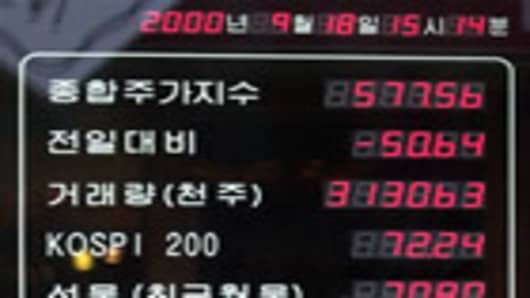Asian markets were mixed in extremely choppy trade Monday with South Korean stocks and the won tumbling after North Korea said it had conducted a nuclear test. This hit regional shares, which were trading higher until the news, stirring caution among investors.
But North Korea's latest provocation, coming after what it called a peaceful satellite launch that sent a rocket over Japan earlier in the year, was not expected to have a lasting impact on investors who have become accustomed to such sabre-rattling.
Seoul's KOSPI index finished down 0.2 percent but had slid more than 4 percent at one point in a knee-jerk reaction to the news, which also gave a boost to the yen as market players trimmed higher-yielding currencies such as the Australian dollar.
The U.S. dollar showed little reaction, edging lower against the yen and holding near a two-month low hit on Friday. But higher-yielding currencies that have surged along with stocks in the past few months lost ground. The Australian dollar weakened, near a session low of $0.7774 on the nuclear test news. Oil prices dropped to $61 a barrel. Market activity was limited, with U.S. and British financial markets closed later in the day for holidays.
Japan's Nikkei 225 Average finished 1.3 percent higher, shrugging off a North Korean nuclear test as steel shares climbed. Nippon Steel, the world's second-biggest steelmaker, and other blast-furnace steelmakers rose after a newspaper reported that major customer Toyota Motor would not seek another price cut from steel mills this financial year, meaning they could see strong profit margins.
Australian shares fell 0.6 percent as banking stocks, such as Macquarie Group, fell after the market regulator lifted a shortselling ban on financial stocks.
In markets still trading, Singapore's Straits Times Index rose 1 percent in choppy trade. Shares of Keppel Corp and Singapore Petroleum Company (SPC) soared as much as 10 percent and 24 percent respectively, after Asia's largest oil and gas producer PetroChina said it will buy Keppel's stake in SPC. Singapore's consumer price index fell an annual 0.7 percent in April, the first drop since June 2005, from a rise of 1.6 percent in March as transport, housing and communication costs fell. Consumer prices contracted 1.5 percent after seasonal adjustments month-on-month, after flattening in March, the Department of Statistics said in a statement on Monday.
More From CNBC.com
- Get After-the-Bell Dow 30 Quotes
- Credit Spreads and Libor Data
- US Futures and Pre-Market Data
Hong Kong shares swung back into the black, up 0.4 percent. Hong Kong-based property developers continued to outperform as investors bet on a turnaround in demand and recovery in property prices in the second half of 2009 amid favorable mortgage terms and low savings rates in the territory. Market leader Sun Hung Kai Properties, which has found favor with top brokerages including Morgan Stanley and Bank of America-Merrill Lynch in recent days, climbed 5.8 percent, while Li Ka-shing's property flagship Cheung Kong Holdings added 7 percent.
China's Shanghai Composite Index gained 0.5% after spending most of the morning in the red. China announced plans to resume initial public offerings as early as next month, earlier than many in the market had expected. The market had been expected to open lower following the announcement after Friday's close of the resumption plan, which will add new supplies of equity to the market.


